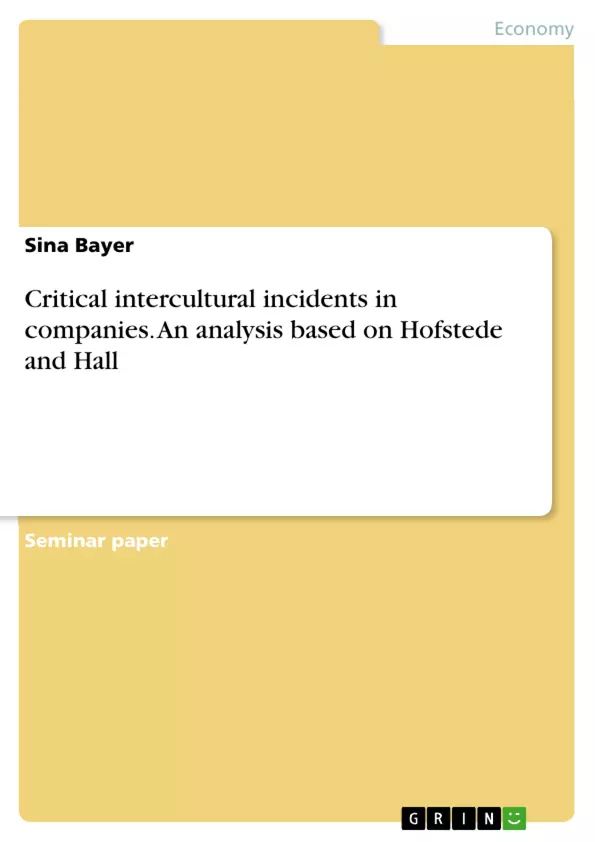This paper presents an analysis of a critical incident of a medium-sized German company. The intercultural Critical Incident took place about three years ago and was presented in an interview with an executive of the company in February 2021. The analysis of the incident is mainly based on the cultural dimensions established by the Dutch cultural scientist Geert Hofstede. The purpose of this paper is therefore to analyze the critical cross-cultural business case in order to be able to provide a concluding recommendation for action as part of a conclusion.
In the course of globalization and networking of world markets, intercultural management has become an essential aspect in the management of nationally and internationally active companies. Within a company's own workforce or in cross-national cooperation between parent companies and subsidiaries, there is an increasing amount of collaboration. Therefore, companies have to deal more and more with the specifics of different cultures. The consideration of cultural and intercultural aspects is becoming an important success factor in entrepreneurial activities.
This also applies to the company Uhlmann, which continues to expand its relations in the former emerging market India. India has undergone rapid economic development and is considered one of the largest and most promising growth markets of the present. For this reason, Uhlmann has opened a branch office in the country three years ago to gain a foothold in this country and maximize sales over there. Entering a country does not always happen without problems, as will be described in this paper on the basis of a critical incident that occurred to Uhlmann in India. Uhlmann, which will be presented in more detail later, is a manufacturer of machines for packaging pharmaceuticals in foil or aluminium packs, so-called blisters and medicine bottles.
Inhaltsverzeichnis (Table of Contents)
- 1. INTRODUCTION
- 2. UHLMANN GMBH & CO. KG – BACKGROUND OF THE ORGANIZATION.
- 3. THEORETICAL BACKGROUND..
- 3.1. GEERT HOFSTEDE
- 3.2. EDWARD TWITCHELL HALL..
- 4. THE MARKET ENTRY OF UHLMANN GMBH & CO. KG IN INDIA
- 5. APPLICATION OF THE METHODS TO THE CASE
- 5.1. APPLICATION ACCORDING TO HOFSTEDE
- 5.2. APPLICATION ACCORDING TO HALL
- 6. CONCLUSION.
- 7. LITERATURE REVIEW
- 8. APPENDIX.
Zielsetzung und Themenschwerpunkte (Objectives and Key Themes)
This paper examines a critical intercultural incident experienced by the German company Uhlmann GmbH & Co. KG during its market entry into India. The analysis aims to identify the cultural dimensions at play and provide recommendations for overcoming similar challenges in the future.
- Intercultural communication and its impact on business operations
- Cultural differences in business practices and their influence on success
- The role of cultural awareness in mitigating intercultural conflict
- The application of cultural frameworks like Hofstede's model in understanding intercultural incidents
- Recommendations for effective intercultural management strategies
Zusammenfassung der Kapitel (Chapter Summaries)
The first chapter introduces the context of the case study, highlighting the increasing significance of intercultural management in globalized business environments. The paper then delves into the background of Uhlmann GmbH & Co. KG, a German manufacturer of pharmaceutical packaging machines, and its strategic decision to establish a branch office in India.
Chapter 3 provides the theoretical foundation for analyzing the intercultural incident, focusing on the work of Geert Hofstede and his model of cultural dimensions. This section explores the key dimensions of Hofstede's framework, including power distance, uncertainty avoidance, individualism vs. collectivism, and masculinity vs. femininity.
Chapter 4 examines the market entry of Uhlmann GmbH & Co. KG in India, outlining the company's objectives and the specific challenges faced during its expansion into this emerging market.
Chapter 5 applies the theoretical framework established in chapter 3 to the critical intercultural incident, analyzing the situation from the perspective of Hofstede's model.
Chapter 6 concludes the analysis, drawing upon the findings from the previous chapters to provide insights and actionable recommendations for intercultural management in the context of Uhlmann's Indian operations.
Schlüsselwörter (Keywords)
Intercultural Management, Critical Incident, Hofstede's Cultural Dimensions, Market Entry, India, Germany, Uhlmann GmbH & Co. KG, Pharmaceutical Packaging, Cross-cultural Communication, Business Strategy, Cultural Awareness.
Frequently Asked Questions
What is a "Critical Intercultural Incident"?
A critical intercultural incident is a situation where cultural differences lead to misunderstandings, conflict, or failure in communication, particularly in a business or organizational setting.
Which company is the subject of this case study?
The study focuses on Uhlmann GmbH & Co. KG, a German manufacturer of pharmaceutical packaging machines, and its expansion into the Indian market.
Which cultural frameworks are used to analyze the incident?
The analysis is primarily based on Geert Hofstede's model of cultural dimensions and Edward T. Hall's theories on high-context and low-context cultures.
What are some key dimensions in Hofstede's model?
Hofstede's dimensions include power distance, uncertainty avoidance, individualism vs. collectivism, and masculinity vs. femininity.
Why is India a significant market for German companies like Uhlmann?
India is considered one of the largest and most promising growth markets due to its rapid economic development, making it attractive for international expansion despite cultural challenges.
- Citation du texte
- Sina Bayer (Auteur), 2021, Critical intercultural incidents in companies. An analysis based on Hofstede and Hall, Munich, GRIN Verlag, https://www.grin.com/document/1002927



